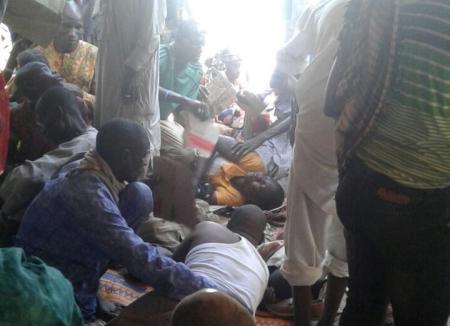
By Kieran Guilbert
MAIDUGURI, Nigeria (Thomson Reuters Foundation) – Aid worker Alfred Davies and his colleagues were providing vaccinations and giving out food in a refugee camp in northeast Nigeria when he noticed the buzzing of a plane passing overhead.
Moments later, a bomb exploded a few hundred metres away.
“Glass shattered, roofs collapsed and people were screaming and crying,” Davies, a project co-ordinator for Medecins Sans Frontieres (MSF), told the Thomson Reuters Foundation by phone.
“I saw people with their bellies open, and intestines on the ground,” the Liberian aid worker said. “People were yelling: ‘Doctor, doctor, help me’ and ‘Save my child, save my mother’.”
Davies would later discover that the devastation was caused by a mistaken military air strike on the camp in Rann, in Borno state, aimed at Boko Haram militants who have made the region the heart of a seven-year bid to create an Islamic caliphate.
At least 90 people were killed by the bombing, including nine aid workers, but the death toll could reach 170, MSF said. Dozens of people have been airlifted to Maiduguri, the capital of Borno, and treated for serious injuries by surgical teams.
The Nigerian Air Force (NAF) said civilians were accidentally killed and wounded in the attack, but neither it nor the government has provided an official casualty figure.
For Davies and his small team working in the camp, which MSF had gained access to just days before the attack, the immediate influx of injured people into their aid tent was overwhelming.
“In the first hour, we saw 52 wounded people arrive,” he said. “There were so many people, but only one doctor, one nurse, and limited supplies to treat them. It was unbearable.”
“HELPLESS, GONE, DEAD”
Doctors and medical supplies are being sent to the Rann camp, which is estimated to house up to 40,000 people, said the U.N. Office for the Coordination of Humanitarian Affairs (OCHA).
Hunger and malnutrition are rife across Rann, which only recently became accessible to humanitarian actors after being under Boko Haram control for several years, aid agencies said.
“We (MSF) had only been there for a few days, but you get to know people, to care about them,” Davies said, adding that he would always remember one mother and her twins whom he had met.
“We had treated the twins for malnutrition. Now, she was dead and her children were crying and screaming: ‘Mama, mama’. They kept crying but the mother was helpless … gone … dead.”
Human Rights Watch (HRW) said the strike hit 100 metres from what appeared to be a Nigerian army compound, and that the NAF should have known the area targeted was full of civilians.
The NAF, which declined to comment on HRW’s statement, said on Thursday it would investigate the air strike, which followed a military offensive against Boko Haram in the last few weeks.
The jihadists’ insurgency has killed more than 15,000 people and forced some two million to flee their homes.
The Nigerian military, with help from neighbouring countries, has pushed the group out from most of the territory it held in 2015.
However, Davies said the air strike could spread fear among the millions of uprooted people who are struggling to survive.
“The inhabitants of the camp came for refuge, for some sort of security. What happened is terrible … it is unacceptable.”
(Reporting By Kieran Guilbert, Editing by Emma Batha; Please credit the Thomson Reuters Foundation, the charitable arm of Thomson Reuters, that covers humanitarian news, women’s rights, trafficking, property rights, climate change and resilience. Visit news.trust.org)